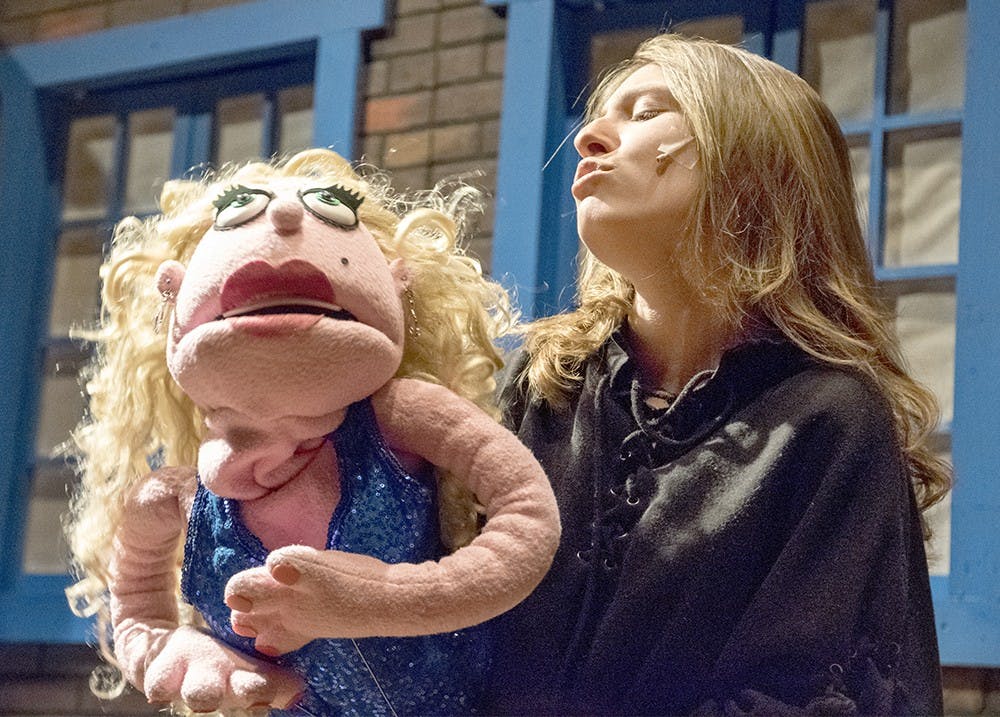The puppets live in two giant black boxes. When the boxes are opened, they peer out from their plastic coverings from where they lie side by side.
They can’t touch the ground, so a chair is flipped upside down and one puppet is impaled on each leg, four to a chair. The position makes their necks eerily long, with their mouths hanging open and eyes staring at the ceiling.
Fifteen puppets, cast members of University Players’ production of “Avenue Q,” are unwrapped and dressed at rehearsal. The process takes about half an hour.
Max Fowler, the human actor who works with lead puppet Princeton, crouches to look one of the Princeton puppets in the eye.
Puppets with the most stage time have duplicates to ease costume changes from scene to scene. They’re essentially identical, but because each puppet is handmade, they have their quirks.
“This one’s eyes are not right,” Fowler says. He looks at Princeton’s clone hanging next to him. “That one’s fine, but this one ... he’s not right."
Fowler thinks Princeton is ugly, but he sees him as his comrade, his high-maintenance best friend.
He feels close to the character, he said. Like Princeton, he’s excited about the world, a little naïve, looking for where he belongs. Fowler is a freshman from Washington D.C., and he said feels like the new kid in a completely different place, like Princeton on Avenue Q.
His first song is “What Do You Do with A B.A. in English,” which laments an anxiety Fowler, as a musical theatre major, can relate to.
“The musical theatre program, they pound into your brain that this is not easy, you need to be prepared for some hard things, and this has been another reminder about it all,” he said. “It’s definitely scary, and I feel his fear and uncertainty.”
In the beginning of the rehearsal process, Fowler said he was overwhelmed by the role and its responsibilities. Then Kaitlyn Smith, one of the directors, told him to let the show happen to him and he doesn’t have to feel like it’s something he has to carry.
So now, he thinks of it as a journey that he goes on. Him and Princeton.
“I look at my puppet and we start,” he said. “We get on the train, and the train will go, and we go on it together.”
***
“It’s a hot mess over here.”
Jes Harris, the stage manager, dresses the puppets while the cast goes over notes. She and two other stage crew members are trying to put a sweater vest and dress shirt on one of them.
“It’s all one piece,” she says. “Son of a bitch.”
It’s tricky to get the clothes on, especially since the puppets have rods attached to their hands, which allow the actors to move them. Harris’s method is putting the shirt on the body first, and then feeding the arms through.
Each puppet has at least one costume change during the show, which is about twenty changes. Smith said it’s like putting clothes on a temperamental toddler. But, if you try to put the clothes over the puppets’ heads like you’d dress a child, their eyeballs pop off.
The puppet clothes have brand names, like Hanes and Faded Glory, and come on little plastic hangers.
The detail on the puppets reflects that of their clothes.
One puppet, named Lucy the Slut, is accentuated with red nail polish and a Marilyn Monroe-like beauty mark. During rehearsal, she wears a hairnet to protect her blonde curls. You can see her nipples through her white and leopard print shirt.
One puppet has five o’clock shadow. Another’s perpetually flipping everyone off.
Harris sends all the actors who will be handling puppets to go wash their hands. It’s part of the agreement the actors signed before working with the puppets — they mustn’t touch them with dirty hands, mustn’t put them on the ground and must pay a fee if they get damaged.
The puppets cost about $2,000 to rent, Smith said. University Players rented from Music Theatre International, the same company that provides rights to the show.
Kevin Renn, the other co-director, said they sprang for the high-quality puppets to provide the best show possible. They also saw how bad low-budget puppets could be on a Tumblr blog called Bad Avenue Q Puppets. The site posts photos of laughably bad puppets that have yarn for hair or misshapen heads.
The puppets on the site are horrendous and sad and that’s not what they wanted for their show, Renn said.
The total budget for the show exceeds $10,000. It’s by far one of the most expensive shows University Players has staged.
Each week of rental after the first eight weeks costs an additional $350, which means limited rehearsal time.
The first week having the puppets, the cast participated in a puppet workshop. Renn said they spent the time getting to know them as friends and people. They focused on hand-mouth synchronization between human and puppet during singing and speaking.
When the puppets first arrived in their black boxes, Julia Thorn was on the fence about them. Thorn plays Kate Monster, the other lead and Princeton’s love interest.
The puppets made her a little nervous, she said, and she felt working with the puppets was either going to be incredible or a complete failure.
“But once they came out of their little coffins — it wasn’t like a person being born, but it was just like wow, now I know what this is about,” she said, “I felt an instant connection.”
***
The cast sits in a semi-circle around the two directors, Renn and Smith.They’re discussing how the actors need to put the puppets in the forefront.
If they fail to do that, Smith tells them, “the audience will stop looking at your puppet and start looking at your big fat ass.”
The actors need to disappear. They need to make their puppet so compelling the audience forgets there’s a person on stage controlling it.
In order for the puppets to come to life, the actors have to pay attention to the little details of movement. A nod, a twitch, a sniffle — they all add up to creating a realistic character.
“If they’re not reacting, they’re dead,” Renn said.
Being so in sync with a hunk of foam and fabric isn’t so easy, Thorn said.
Before running a scene, Thorn puts her puppet at eye level and does mirroring exercises to establish a connection. If she doesn’t, she says, it’s no good — they aren’t coordinated.
But the connection has to go beyond the small stuff, like during a sex scene between Princeton and Kate Monster.
“We’re losing our virginities through our puppets,” Thorn joked to Fowler during rehearsal. “So, are we virgins anymore?”
Acting with the puppets for a long time can be physically uncomfortable. After a while, Fowler said, his arm and back start to ache and the insides of the puppets get hot and sweaty.
When he steps off stage, he takes the puppet off and blows cold air into it.
Working with a puppet is double the work for the actor, Fowler said. Remembering choreography for both himself and Princeton. Making sure Princeton is earning the credit for his work. Ignoring his cramping thumb.
But it’s still going to be hard for him to let Princeton go.
“Especially because he’ll be shipped away,” Fowler said. “I won’t have him, I won’t see him again. Once it’s over, he will be gone.”
At the end of rehearsal, the actors put the puppets back into their clear plastic bags, back into the black boxes. Then they heft them to a storage room and lock them away.






